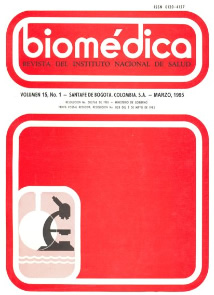Frecuencia del intercambio de cromátides hermanas en un grupo de individuos expuestos ocupacionalmente a los vapores de derivados del petróleo
Abstract
Sister chromatid exchange frequencies (XSCE) were evaluated in 156 individuals occupationally exposed to petroleum-vapour derivatives and in 36 non-occupationally exposed individuals. The exposed group was subdivided into four with regard to the work area. A high XSCE (P,0.01) was found in the four exposed groups, G1, PA, PB and LI (9.51,9.66,10.20,9.38, respectivelly), compared to the control group (7.74). It was found that the total work-exposed time (duration of employment), smoking habits and intrinsic work-area environment, induce SCE. Age did not affect SCE induction. A significant reduction (P<0.05) in the celullar kinectics' index (ICK) of 73 exposed individuals (ICK=2.08) compared to 27 control individuals (ICK=2.37) was found. The results suggest that chronic and/or acute exposure to petroleum vapour derivatives induce SCE and also could reduce the proliferation and reduction of the cellular cycle in vitro of come of the occupationally exposed individuals, with regard to work-area, total work-exposure time and smoking habits, the susceptibility depending on the degree of radiation to which each genome was exposed.
Downloads
| Article metrics | |
|---|---|
| Abstract views | |
| Galley vies | |
| PDF Views | |
| HTML views | |
| Other views | |


























